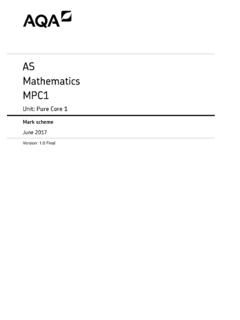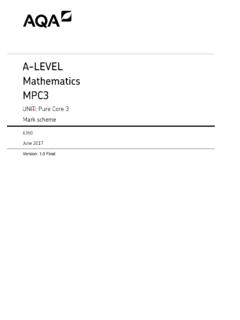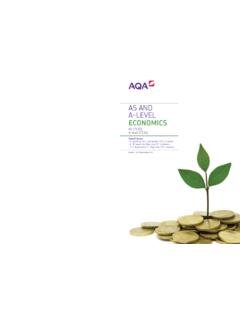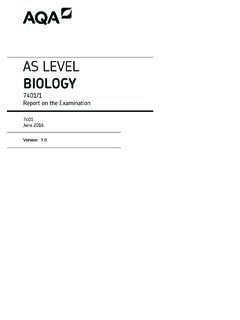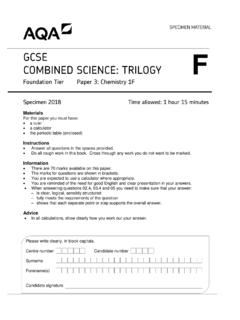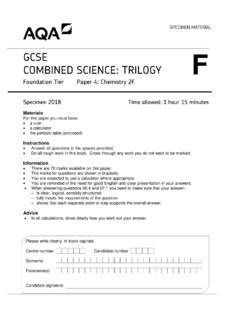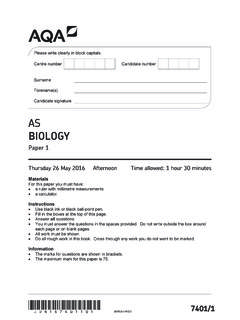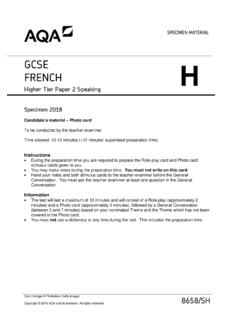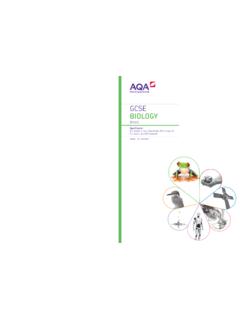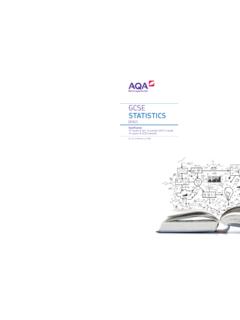Transcription of GCSE Mathematics Teacher guidance Teacher guide: …
1 MathematicsChoosing the best qualifications for your studentsMathematics for teaching from September 2011 onwards ( version )Whatever your route through ..we can guide and supportyou and your students. At AQA we work in partnership with teachers to offer a range of maths qualifications. We develop specifications that: engage and inspire students encourage students to realise their full potential are easy to brochure provides an introduction to all our maths qualifications, from Entry level to A-level. You will find different paths that ensure a successful and rewarding experience for students of all abilities and learning styles. For the most up to date information see our website and resourcesAt AQA, we believe everyone can be successful in maths, that s why we offer many support services and products to help schools and colleges, including: a wide variety of printed and online support materials Maths Advisers instant exam results analysis an inspiring programme of Continuing Professional Development (CPD) ensuring open lines of communication to our subject experts so you can ask us questions and tell us what you need free face to face training meetings with senior examiners when launching new for teaching from September 2011 onwards ( version )1 Our qualificationsPathways through maths 2-4 Entry Level Entry Level Certificate in Mathematics 5 Entry Level Certificate in Adult Numeracy 5We provide a broad range of qualifications to suit the needs and interests of every student, at every stage of their Mathematics Entry level 6 Level 1 and 2 7 GCSE and equivalent Mathematics 8 Mathematics (Linear) 9 AQA Level 2 Certificate in Further Mathematics ( igcse )
2 10 Statistics 11 Linked Pair pilot 12 AQA Certificate in Use of Mathematics 13 Free-Standing Mathematics Qualifications (FSMQs) Foundation level 14 Higher level 14 Advanced level 14AS and A-levels Use of Mathematics (AS-level) 15 Use of Mathematics (AS/A-level pilot) 16 Mathematics 17 Further Mathematics 18 Statistics 19 Resources and support 20 ContentsMathematics for teaching from September 2011 onwards ( version )2 Whatever path a student takes through maths, our qualifications are designed so that appropriate routes can be found through mathsWe offer a wide range of options tailored to different types of learners. This enables you to equip your students with the mathematical skills and knowledge that best meet their of routes for more, see our interactive Maths PathfinderFunctional Skills qualifications focus on process skills, rather than mathematical content.
3 They require students to assess the maths required and work in a realistic the end of Key Stage 3, most students are capable of attaining a Level 1 Functional Skills qualification. Students who hope to achieve grade A or higher at GCSE should be able to achieve Level who hope to achieve grade F or G at GCSE at the end of Key Stage 4 could take Entry Level Functional Mathematics at Entry 3 before moving on to students may follow an Entry Level Certificate (ELC) instead of, or alongside, the Foundation Tier of GCSE. The eight ELC units can be structured to link with GCSE units. Alternatively, a decision on GCSE entry can be deferred until later in the course and a linear GCSE taken. Functional Mathematics at Entry 1, 2 and 3 is also available to support teaching maths process over two yearsA unitised two-year course starting in September can prepare learners for Unit 2 in March and Unit 1 in June of the first year. Unit 3, which completes the qualification, can be added in March or June of the second over three yearsMany schools start preparing for GCSEs in Year 9 and students may be ready for the first unit in November of Year 10; either Unit 1 or Unit 2.
4 This can be followed by a second unit in March or June, with a view to completing the third unit and the qualification in the November or March of Year approach is to start the course in Year 9 without early entry but adding breadth to the curriculum by: teaching GCSE Statistics alongside Units 1 and 2 of GCSE Mathematics and entering Functional Mathematics at level 1 or 2 or adding a Foundation (level 1) or Higher (level 2) FSMQ in an area of maths that supports other GCSE StatisticsFor those who prefer linear GCSE Mathematics , this can also be studied alongside GCSE Statistics, where Statistics is completed after the first year and maths after two expected to achieve A or A* in GCSE Mathematics by the end of Year 10 can then take any of the following subjects in Year 11: GCSE Statistics at the Higher Tier AQA Level 2 Certificate in Further Mathematics ( igcse ) Advanced FSMQs (Level 3) AS Use of will provide excellent preparation for A-level Mathematics and Further Stage 3 (Year 9)Key Stage 4 For resources and support see page 20 Mathematics for teaching from September 2011 onwards ( version )3 Key Stage 5 Entry 3 or GCSE grades F GGCSE grades B CGCSE grades A* AiGCSE Further Mathematicspossibly with GCSE StatisticsPrior attainmentFoundation FSMQ then Higher FSMQ leading to AQA Certificate in Use of Mathematicsplus Functional MathematicsAdvanced FSMQ leading to AS or A-level in Use of MathematicsIn many schools and colleges, A-level Mathematics with a GCSE grade BA-level MathematicsplusA-level Further MathematicsKey Stage 5 studyLevel 2 and 3 qualifications in Further Education possibly vocational in natureDegree course where some maths is requiredDegree course requiring a high level of maths (STEM)
5 Possible progressionThe table below shows three routes through Key Stage 5. For more ideas, see our interactive Maths Pathfinder at Key Stage 4, A-levels in Mathematics , Further Mathematics and Statistics are available for those who have achieved good grades at GCSE. These qualifications will provide excellent preparation for those planning to undertake further study, particularly in Science, Technology, Engineering and Mathematics (STEM) option is the AS-level Use of Mathematics or the A-level Use of Mathematics pilot. These qualifications encourage more students to study maths beyond the age of 16. They provide support for other subjects (eg, sciences), strengthen university applications and improve opportunities in the employment Mathematics Qualifications (FSMQs) are available at Foundation, Higher and Advanced levels and offer a flexible approach to engaging students in maths. FSMQs are stand-alone qualifications that offer practical and relevant maths, can be tailored to the needs of other subjects and can support students aspirations for higher resources and support see page 20 Mathematics for teaching from September 2011 onwards ( version )4 Year 9 Year 10 JuneJanuaryJuneNovemberMarchYear 11 JanuaryNovemberJuneProgressionMarchFunct ional Skills Entry 2 Unit 2 Units 1 and 2 Unit 2 Level 2 Functional SkillsUnit 1 Unit 2 GCSE StatisticsGCSE linearUnit 1 Level 2 Functional SkillsGCSE Foundation Tier OR FoundationFSMQS tudents looking for other qualifications in the post-16 environment could look to ELC Adult Numeracy and the AQA Certificate in Use of wishing to re-sit GCSE could also consider the AQA Certificate in Use of Mathematics or Higher FSMQs as an Grade B or better is generally considered suitable preparation for A-level Mathematics .
6 For students who enjoy maths but do not want to embark on AS, other qualifications at Key Stage 5 include Advanced FSMQs, and AS Use of with the igcse qualification are ideally prepared for A-level Mathematics and Further 3 Unit 3 Unit 3 Unit 3 GCSE lineariGCSEGCSE Statisticsand/oriGCSEUnit 3 GCSE early entryELCC ommonadditionalqualificationCommonadditi onalqualificationGCSE in three years semi linear Unit 2 firstUnit 1 firstwith Functional SkillsEarly entry GCSE at Higher Tier with iGCSEL evel 1 Functional SkillsUnitisedLinearUnit 1 ELC PortfolioGCSE in one yearJanuaryJuneNovemberMarchUnit 3 Linear GCSEUnit 1 and 2 UnitisedLinearGCSEF unctional Skills at Entry 3 or Level 1 represent some natural progression for ELC Mathematics more information on ELC Mathematicsweb: : mathematicsgcse 0161 957 3852 For more information on ELC Adult Numeracyweb: : ondemand2 01483 556 100 Mathematics for teaching from September 2011 onwards ( version )5 Entry Level Certificates in Mathematics and Adult NumeracyAdult NumeracyThis qualification provides an opportunity for adult learners who may have missed out on essential numeracy skills and knowledge in the past, to achieve a recognised qualification.
7 This qualification enables learners to: improve job prospects or enter the world of work gain the most out of life, learning and work progress to Level 1 and 2 studies, particularly in Functional Mathematics . The assessmentThe ELC in Adult Numeracy offers real flexibility. One question paper at each level, which is available when learners are ready to be tested. Tests are on-demand so they can be held on a date convenient to you. Learners can re-sit the qualification as many times as they qualification is designed for students who are unlikely to reach Grade G at GCSE. This qualification is an excellent choice for many students because it: gives teachers flexibility in the order and timing of units to allow co-teaching with the Foundation Tier of GCSE (final entry decisions can be deferred until February in the final year of the course) allows students to work in short programmes due to the unit-based structure, helping them to gain a sense of achievement throughout the course and gain recognition of each unit of work via the Unit Award assessmentThe Entry Level Certificate (ELC) in Mathematics consists of eight units with a choice of externally-set and internally-set assessments that.
8 Conveys the knowledge, skills and understanding needed to apply mathematical concepts to real-life situation builds a firm foundation for further unit covers a range of outcomes at Entry levels 1, 2 and 3 and the portfolio of work is moderated by resources and support see page 20 Mathematics for teaching from September 2011 onwards ( version )6By studying Entry Level Functional Maths, students can progress to Functional Maths, Level 1 and more informationweb: : mathematicsgcse 0161 957 3852 Entry Level Functional Mathematics Functional Skills qualifications in Mathematics at Entry 1, 2 and 3 are available from September 2011. Entry Level Functional Mathematics enables students to: acquire mathematical and other transferable skills relevant to everyday life and the world of work develop mathematical thinking through an engaging, active approach progress to the next level of Functional Mathematics or to the Foundation Level of GCSE assessmentThe assessment for Entry Level Functional Mathematics : is all internally assessed and moderated by AQA involves one-to-one practical tasks at Entry 1 and 2 involves written tasks at Entry 3.
9 For resources and support see page 20 Mathematics for teaching from September 2011 onwards ( version )7 Functional Mathematics Level 1 (4367) and Level 2 (4368) Functional Mathematics is based on the same skills developed in our GCSE Mathematics Functional Mathematics : teaches useful mathematical skills that can be applied to everyday life and work promotes mathematical thinking and transferable skills develops problem-solving ability builds confidence offers assessmentFunctional Mathematics assesses the skills of representing, analysing and interpreting, with unlimited re-sit 1 Level 26060 MarksAllowedAllowedCalculator1 hour 30 mins1 hour 30 minsDurationSingle written paperSingle written paper It s about improved, general, transferable skills, which they can apply to anything, whatever they choose to study, whatever direction they want to go in. Phil Eadie, Maths Teacher , The Thomas Hardye School, DorchesterStudents with this qualification will be familiar with the problem-solving approaches that feature in GCSE Mathematics , at both tiers.
10 The real-life nature of questions also represents sound preparation for FSMQ more informationweb: : mathematicsgcse 0161 957 3852 For resources and support see page 20 GCSE Mathematics (4360)Our GCSE Mathematics gives you an exciting opportunity to teach maths the way you ve always wanted to. It s less about teaching to the test and more about process skills and problem-solving. Three assessment opportunities a year and the ability to mix and match tiers means there s plenty of flexibility to motivate students and get the best possible outcome. Teachers tell us of the importance of sound technique in working with numbers and understanding fractions, decimals, percentage and basic ratio. So these features are applied across all three units, giving students opportunities to apply essential skills in a variety of ways, including everyday contexts, statistical problems and more abstract mathematical assessmentAll units are available in November, March and June. They can be taken in any order and the qualification can be delivered as a modular or linear ll be supported throughout your teaching with a range of training, advice and free resources, which will save you time and money, including: advice and guidance Maths Subject Team and regional Maths Advisers AQA All About Maths including past question papers and mark schemes, assessment guidance and Exampro to create your own question papers from a bank of past questions regular e-mail updates analysis of your results with Enhanced Results Analysis (ERA).
